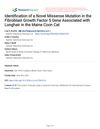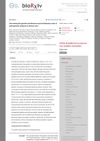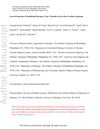 23 citations,
May 2009 in “International Journal of Dermatology”
23 citations,
May 2009 in “International Journal of Dermatology” AR gene not major factor in female hair loss; different from male hair loss.
 2 citations,
June 2021 in “Research Square (Research Square)”
2 citations,
June 2021 in “Research Square (Research Square)” A new gene mutation causes long hair in some Maine Coon cats.
 January 2024 in “bioRxiv (Cold Spring Harbor Laboratory)”
January 2024 in “bioRxiv (Cold Spring Harbor Laboratory)” The research found that genetic factors for male pattern baldness in African men differ significantly from those in Europeans.
 March 2009 in “International Journal of Dermatology”
March 2009 in “International Journal of Dermatology” The androgen receptor gene doesn't help identify women likely to have female pattern hair loss.
 40 citations,
February 2005 in “Fertility and Sterility”
40 citations,
February 2005 in “Fertility and Sterility” Some women with PCOS have CYP21 mutations and IRS1 variants, but these genetic factors are not major contributors to PCOS.
 2 citations,
October 1990 in “The Lancet”
2 citations,
October 1990 in “The Lancet” Some people have a genetic variation that makes them less effective at breaking down drugs.
55 citations,
November 2010 in “Journal of Allergy and Clinical Immunology” The L412F variant of TLR3 is linked to skin infections, more viral infections, and autoimmune issues.
 20 citations,
December 2000 in “Fertility and Sterility”
20 citations,
December 2000 in “Fertility and Sterility” The N363S gene variant does not cause higher adrenal androgen levels in women with polycystic ovary syndrome.
7 citations,
February 2019 in “Veterinary medicine and science” An American Bully with a genetic skin condition improved significantly with specific topical treatments.
2 citations,
July 2021 in “Genes” A specific genetic change in the KRT71 gene causes a hair loss condition in Hereford cattle.
 2 citations,
July 2015 in “Archives of Dermatological Research”
2 citations,
July 2015 in “Archives of Dermatological Research” A new gene variant in the DSP gene is linked to a unique type of hair loss.
 41 citations,
March 2012 in “Clinical and Experimental Dermatology”
41 citations,
March 2012 in “Clinical and Experimental Dermatology” G allele of AR Stul polymorphism linked to higher hair loss risk, especially in white people.
 28 citations,
August 2014 in “Journal of Assisted Reproduction and Genetics”
28 citations,
August 2014 in “Journal of Assisted Reproduction and Genetics” The VEGF +405G allele may increase the risk of PCOS in South Indian women.
 77 citations,
April 2009 in “British Journal of Dermatology”
77 citations,
April 2009 in “British Journal of Dermatology” Aromatase gene variation may increase female hair loss risk.
 111 citations,
October 2008 in “Nature Genetics”
111 citations,
October 2008 in “Nature Genetics” Researchers found a new gene area linked to male-pattern baldness, which, along with another gene, significantly increases the risk of hair loss in men.
 4 citations,
January 2016 in “International journal of reproduction, contraception, obstetrics and gynecology”
4 citations,
January 2016 in “International journal of reproduction, contraception, obstetrics and gynecology” A certain genetic variation is linked to a higher risk of polycystic ovarian syndrome.
 4 citations,
December 2012 in “Human Biology”
4 citations,
December 2012 in “Human Biology” The most different genetic segment between Africans and East Asians is the EDA2R/AR region, with two main types influenced by population changes and natural selection, and linked to baldness.
 August 2024 in “OSMANGAZİ JOURNAL OF MEDICINE”
August 2024 in “OSMANGAZİ JOURNAL OF MEDICINE” The visfatin GT genotype may increase the risk of Alopecia Areata.
 9 citations,
March 2020 in “Gene”
9 citations,
March 2020 in “Gene” Certain gene variants in estrogen receptors are linked to polycystic ovary syndrome, mainly affecting metabolism, in Tunisian women.
9 citations,
May 2019 in “Medicine” The C-allele and CC-genotype in the PTPN22 gene lower the risk of alopecia areata.
 March 2016 in “West Indian medical journal”
March 2016 in “West Indian medical journal” There is no significant link between alopecia areata and the PON1 enzyme polymorphisms studied.
 23 citations,
January 2014 in “International Journal of Biological Sciences”
23 citations,
January 2014 in “International Journal of Biological Sciences” African American men with prostate cancer have more androgen receptor mutations, which may lead to more aggressive cancer compared to Caucasian American men.
 7 citations,
May 2019 in “Journal of the Formosan Medical Association”
7 citations,
May 2019 in “Journal of the Formosan Medical Association” HSD3B1 gene variant and being overweight linked to hair loss in women with polycystic ovary syndrome.
 24 citations,
November 2015 in “Annals of Nutrition and Metabolism”
24 citations,
November 2015 in “Annals of Nutrition and Metabolism” Certain SHBG gene variants, like rs727428, are linked to higher testosterone levels in women with PCOS.
 January 2016 in “International journal of reproduction, contraception, obstetrics and gynecology”
January 2016 in “International journal of reproduction, contraception, obstetrics and gynecology” A certain gene variation is linked to a higher risk of polycystic ovarian syndrome in South Indian women.
 103 citations,
October 2003 in “Birth Defects Research”
103 citations,
October 2003 in “Birth Defects Research” Both genes and environmental factors like chemicals may contribute to the increase in hypospadias, but the exact causes are still unclear.
 11 citations,
March 2020 in “American Journal of Medical Genetics Part A”
11 citations,
March 2020 in “American Journal of Medical Genetics Part A” A mutation in the EDNRA gene causes Oro-Oto-Cardiac syndrome, affecting face and heart development.
 August 2023 in “Sabuncuoglu Serefeddin Health Sciences”
August 2023 in “Sabuncuoglu Serefeddin Health Sciences” CT60 polymorphism might increase the risk of Alopecia Areata.
 January 2023 in “International Journal of Zoological Investigations”
January 2023 in “International Journal of Zoological Investigations” Certain genetic variations in IL-16 may increase the risk of alopecia areata.
 April 2018 in “bioRxiv (Cold Spring Harbor Laboratory)”
April 2018 in “bioRxiv (Cold Spring Harbor Laboratory)” A gene variant causes patched hair loss in mice, similar to alopecia areata in humans.


























